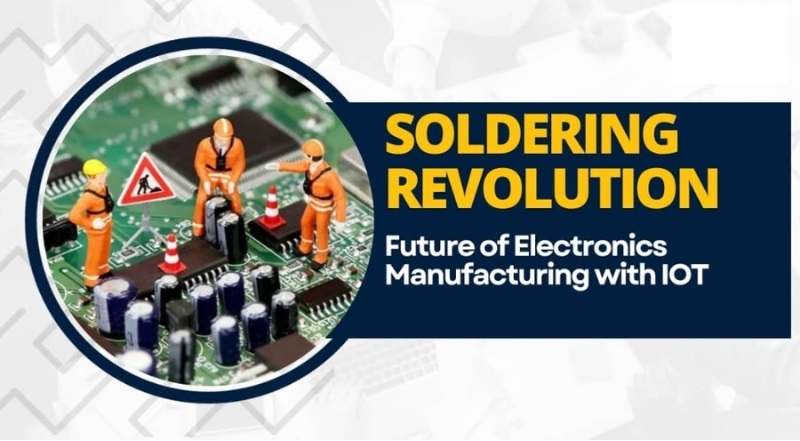
The Internet of Things (IOT) has permeated nearly every industry, transforming the way we live and work. In the realm of electronics manufacturing, IOT is playing a pivotal role in enhancing efficiency, quality control, and traceability. This blog post delves into the innovative integration of IoT in soldering processes and explores how it’s reshaping the future of electronics manufacturing.
The Intersection of IOT and Soldering
Traditionally, soldering processes have been manual, and monitoring them requires human intervention and extensive quality control checks. However, with the advent of IoT, manufacturers are now able to connect soldering equipment to the internet, creating smart and interconnected soldering systems.
Here’s how IOT is making an impact in the soldering world:
- Real-time Monitoring: IOT-enabled soldering equipment can provide real-time data on various parameters, such as temperature, solder flow rate, and solder joint quality. This data can be monitored remotely, allowing manufacturers to ensure that soldering processes are running within specified parameters.
- Predictive Maintenance: IOT sensors can detect signs of equipment wear and tear, allowing for predictive maintenance. This reduces downtime and prevents unexpected breakdowns, ensuring that the soldering equipment is always in optimal working condition.
- Quality Assurance: IOT-connected soldering machines can monitor solder joint quality during the production process. If a solder joint does not meet the specified standards, the system can trigger an alert or even make real-time adjustments to correct the issue, reducing the chances of defective products entering the market.
- Traceability: IOT in soldering offers complete traceability of the soldering process. Manufacturers can track each soldered joint’s data, including the operator, time, and materials used. This level of traceability is invaluable for quality control and compliance with industry standards.
- Remote Control and Automation: IOT allows for remote control and automation of soldering equipment. This means that soldering processes can be initiated, monitored, and controlled from anywhere with an internet connection. This is particularly beneficial for companies with multiple manufacturing facilities or those looking to streamline production.
- Data Analytics and Optimization: The data collected by IOT-enabled soldering equipment can be analyzed to identify trends and areas for improvement. Manufacturers can use this data to optimize soldering processes, reduce waste, and enhance overall efficiency.
Benefits of IOT in Soldering
The integration of IoT into soldering processes offers a wide range of benefits:
- Enhanced Quality Control: IoT ensures that soldering processes consistently meet quality standards, reducing the likelihood of defects and rework.
- Improved Efficiency: Real-time monitoring and automation lead to more efficient soldering processes, reducing production time and costs.
- Cost Savings: Predictive maintenance and reduced downtime result in cost savings on equipment repair and replacement.
- Greater Visibility: Manufacturers gain complete visibility into the soldering process, making it easier to identify and rectify issues.
- Adaptability: IoT allows manufacturers to adapt quickly to changing production requirements and standards.
- Data-Driven Decision Making: Data collected by IoT sensors can be used to make informed decisions, leading to continuous process improvement.
Conclusion
IOT is revolutionizing soldering in the electronics manufacturing industry, ushering in an era of smarter, more efficient, and more reliable soldering processes. As the demand for smaller, more intricate electronic devices continues to grow, the role of IoT in ensuring the quality and efficiency of soldering operations becomes increasingly critical.
Manufacturers who embrace IoT in soldering will be better equipped to meet the challenges of the ever-evolving electronics industry and stay competitive in a fast-paced market. The future of electronics manufacturing is connected, data-driven, and IOT-enabled and it’s an exciting place to be.
For more information log in to @sumitron.com
Our Top Products:
- Smoke Absorber
- Soldering Iron
- Automatic Tape Dispenser
- Rework Station
- Automatic Label Dispenser Machines
Related Blogs:
- Advantages of Using Modified Silicones
- What Is The Best Method Of Cleaning Soldering Iron?
- What is The Best Method to Control Dispensing Quantity?
- What is A Good Soldering Joint?
- ESD Protection & ESD Safe Consumables
- Work of ESD Testing and ESD Protection Devices
- SMT Glue: How Does SMT Glue Work?
- Revolutionizing Electronics Manufacturing: Best Selective Soldering Equipment
- Best Transducerized Screwdrivers and It’s Application & Benefits







